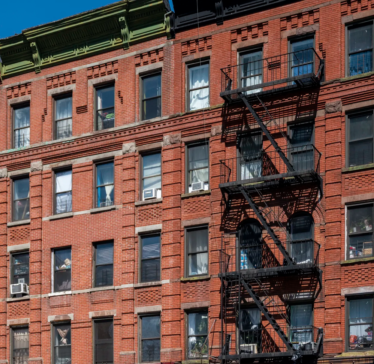By Bob Tannenhauser
There are thousands of rent-regulated apartments on the Upper West Side.
Every year, the Rent Guidelines Board (RGB) determines the size of the rent increases allowed on these apartments.
Their purpose is to ensure that the landlord’s net operating income (NOI) remains stable, i.e. is the same as it was the year before, in the face of increased operating costs.
On April 14, the RGB released a report setting forth three methods for computing the increases, which would yield raises ranging from 2.7% to 9% on rent-regulated apartments.
“The ranges are considered starting points, and the board has often ignored the suggestions,” according to The Real Deal. “In fact, the board froze rents in 2020 and approved a partial freeze on one-year leases last year, despite initial recommendations for higher increases.”
To be clear, the report does not include a recommendation for a particular percentage increase in rent. What it does do is set forth the different methodologies used to analyze the impact of projected increases in landlord expenses on net operating income.
The Board used what is called the Price Index of Operating Costs (PIOC) to measure the change in seven categories of costs incurred in the operation and maintenance of buildings with regulated units. These include: real estate taxes, labor costs, fuel, utilities, maintenance, administrative costs, and insurance costs.
In 2021, except for real estate taxes, which decreased by 3.7%, all of the other costs numerated increased. Fuel increased by 19.6%; insurance by 10.9%; maintenance, 9.2%; administrative costs, 6.7%; utilities 5.8%; and labor costs by 4.1%. The seven components were weighted to take into account their impact on overall operating costs, and the resulting price increase index was determined to be 4.2%, and is expected to rise 4.7% in 2022.
In simple terms the report provides formulae for generating the estimated increase required for one- and two-year leases to compensate owners for the increases in operating costs as measured by the PIOC.
The first formula — Net Revenue — takes into account the term of the leases actually signed by tenants, but does not adjust for inflation. Under the Net Revenue formula the 4.2% increase in PIOC would yield a 3% increase for one-year leases and 6% for two-year leases.
The second formula — Consumer Price Index-Adjusted NOI — considers the proportions of one- and two-year leases and adjusts for inflation, and would yield a 4.5% increase for a one-year lease and 9% for a two-year lease.
The third formula — the traditional formula — relies upon the PIOC projection and would yield a 2.7% increase for a one-year lease and 4.3% for a two-year lease.
The report acknowledges that all of the formulas have “limitations…and may be best thought of as a starting point for deliberations.”
Both landlord and tenant advocates have attacked the report.
“A public meeting where testimony will be heard is scheduled to take place virtually on April 26,” 6Sqft reported. “A vote on the final determination will take place this summer.”









How about rent control …and SCRIE?
What is the expected increase and when?
TY, Neal
The report deals only with rent stabilized apartments. See https://rentguidelinesboard.cityofnewyork.us/resources/faqs/rent-control/ for information on rent contolled apartments.
The average increases on our renewal tenants in our non-regulated apartments in NJ, PA and WV is currently about 7%.
Change in market rates for first time renters is considerably more.
Our expenses have risen at perhaps 8% and employees are averaging annual increases of 10%. And it is very difficult to find workers and to keep them.
Am I to understand that even after entering into a renewal lease on a stabilized unit, if the laws change, the landlord can adjust the increase in rent to reflect that?
We just entered into a 2year renewal lease on our stabilized apartment, with a 2.5% increase. (A one year renewal was a 1.5% increase.)
I’m confused as to what the advantage is to enter into a 2 year renewal if the laws can change change during the term and the landlord could hike it up to a 9% increase in the middle of the lease.
Would appreciate any insight!
The rent increase would not apply. When you next renew your lease any increase approved for that year would apply
Thank you so much for your response. We have a “preferential rent rider” on this lease, with one of the clauses saying that during the term of the lease, the preferential rent shall be subject to adjustment in accordance with adjustments authorized by rent stabilization law. Does this still mean that we are locked into the rent amount that we signed on for in this 2 year renewal? There is a “maximum legal rent” amount which is much, much higher than the “preferential rent” amount which we signed up for since we moved in.
Michael go to this link for an explanation of your rights https://hcr.ny.gov/fact-sheet-40
Look at all this bureaucracy and expense and time and nonsense to determine what landlords can charge.
How about letting the market determine what the correct rent should be? This is how rent is determined in every other city in the country (besides San Francisco).
Both SF and NYC have rent regulation and both cities have perennial housing affordability problems. See the connection?
This is just one further example of how progressives destroy big cities.
So let me get this straight. If we eliminate rent regulation, landlords will reduce rents so that we will have better affordability. Well knock me over with a feather. Here I thought they would increase rents. Do you really believe that. For some reason I dont
The market decides commercial rents in NYC. Have you walked down Broadway lately? Empty unit, bank, CVS, empty unit, bank.
Asking rent is only small part of things affecting commercial retail.
Large part of things is simple fact rise of online and apps have totally changed retail landscape. You only have to walk down any street on trash recycling day to see mountains of shipping boxes out for collection.
Where one UPS or FedEx driver could do a route several city blocks long, now two persons work a truck that only covers a few blocks. That is just how much stuff is being delivered nowadays. Then you have small army of Amazon and other delivery persons as well.
Banks are also joining push towards customers doing more online, so they have less need for physical branches.
“Banks are also joining push towards customers doing more online, so they have less need for physical branches.”
So that’s why we have a bank on every blocK?
You ask every commercial tenant who vacates and their answer is the same “I couldn’t afford the rent. “
No, I don’t see a connection.
LA doesn’t have such laws. And housing there is unaffordable for many.
There is a large contingent of folks who believe people have a right to live somewhere expensive even if they can’t afford it. I don’t understand this attitude. I would have loved to live in Manhattan after college but I couldn’t afford it. So I didn’t. And when I did move here I lived in the living room of a one-bedroom apartment. So obviously I am anti rent regulation because it’s unfair to those not lucky enough to secure one of these units and it’s unfair to landlords.
It’s not about wanting to live somewhere cool and expensive, it’s about living close to good public transit, good public health care, good public schools, public libraries, public museums, and public community spaces. If the rest of the country offered an ounce of what you could find in New York, folks wouldn’t be clamoring to hold onto the last vestiges of adorable apartments through stabilized leases. Most folks I know in stabilized apartments would move if there was an option similar to what they currently have, but it doesn’t exist so the smart thing is to hold onto what they have now. Tycoons are buying up trailer parks for Christ’s sake, real estate is the new oil, gold, cotton, and steel.
Is that why the population is slowly declining?
BOSTON GOT RID OF RENT LAWS SEVERAL YEARS BACK,NOW THEY RANK #3 IN HIGHEST RENTS IN U.S.A…..HOW’D THAT WORK OUT
@ Carl Stockdale
Your arguments make no sense. Rents in Boston increased not because because controls were lifted but because the population grew and the housing supply did not keep pace with this growth.
Here’s a perspective of rent control in Boston that states rent control will cause more harm than good – exactly what is happening in NYC
https://commonwealthmagazine.org/opinion/rent-control-is-not-the-answer-for-boston/
You’re not exactly right about every other city.
Currently, the city of Los Angeles is not allowing any rent increases on existing tenants until one year after the Covid emergency ends. That would be some time in 2023. During normal times existing tenants are allowed increases of about 3% per year.
The entire state of California has a less restrictive formula, but it applies to most rental properties in the state. The state allows 5% plus inflation each year.
The state of Oregon also has rent control. These are just a few examples of other places in the country with limitations on rent increases. It’s not unique to NY and SF by any means.
In every single state with some sort of rent control or other regulation such housing is in short supply. Funny that!
This and what market rate rental housing that does exist often cost more than it should.
https://www.wweek.com/news/2022/04/13/as-a-portland-renter-in-a-squeezed-market-how-do-i-stay-where-im-living/
Finally even with rent regulation, good number of tenants in such units still go on about how they cannot afford housing.
Economics 101 has repeatedly stated government interference in markets often causes more harm than good.
NYS has had nearly 70 years of rent regulation (first RC laws went into effect during WWII), and somehow, somehow rental housing in much of state is in short supply, more so units that are “affordable”.
what what about rent controlled apartments which were so overcharged in their increases
Adams will go down as the landlords greatest friend with his selection to the rent guidelines board.
The “burden” landlords claim from regulation allowed them to buy their buildlngs for pennies on the dollar.
Having bought them with regulation in place at a low price they now want to get large rent increases or better yet reduce or elimination the regulation that they “bought into”
About half of all rental housing falls under rent control or stabilization.
When you add public housing, vouchers and other subsidies close to or bit above 60% of rental housing is under some sort of government control. That leaves those in market rate housing fighting for scraps.
Rent stabilization and what’s left of control will never, ever end in NYS which by extension means NYC and few other areas it covers.
Immediate impact would be hundreds of middle age and senior citizens who are such tenants thrown into chaos. Good number barely can afford their below market rate housing now, and that’s with rent really, really below market. Where would they all go?
This being said largest hit from ending rent regulations would be felt in Manhattan. In other areas of city regulated rents are often higher than market for same area.
They could grandfather in the existing beneficiaries and return the apartment to the market when the beneficiary leaves or passes away. This would gradually phase out the program.